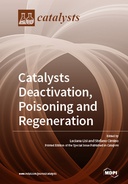Explore

Catalysts Deactivation, Poisoning and Regeneration
Luciana Lisi and Stefano Cimino
2019
0 Ungluers have
Faved this Work
Login to Fave
Catalyst lifetime represents one of the most crucial economic aspects in industrial catalytic processes, due to costly shutdowns, catalyst replacements, and proper disposal of spent materials. Not surprisingly, there is considerable motivation to understand and treat catalyst deactivation, poisoning, and regeneration, which causes this research topic to continue to grow. The complexity of catalyst poisoning obviously increases along with the increasing use of biomass/waste-derived/residual feedstocks and with requirements for cleaner and novel sustainable processes. This book collects 15 research papers providing insights into several scientific and technical aspects of catalyst poisoning and deactivation, proposing more tolerant catalyst formulations, and exploring possible regeneration strategies.
This book is included in DOAB.
Why read this book? Have your say.
You must be logged in to comment.
Rights Information
Are you the author or publisher of this work? If so, you can claim it as yours by registering as an Unglue.it rights holder.Downloads
This work has been downloaded 467 times via unglue.it ebook links.
- 53 - pdf (CC BY-NC-ND) at Unglue.it.
Keywords
- aluminum sulfate
- ammonium sulfates
- barium carbonate
- biogas
- catalyst
- Catalyst deactivation
- catalyst durability
- catalytic methane combustion
- Co-Zn/H-Beta
- CO2 reforming
- coke deposition
- Copper
- CPO reactor
- Cu/SSZ-13
- cyclic operation
- deactivation
- deactivation by coking
- deactivation mechanism
- DeNOx
- diesel
- dry reforming of methane
- effect of flow rate
- exhaust gas
- homogeneous catalysis
- hydrogenation
- in situ regeneration
- iso-octane
- Liquefied natural gas
- Low-temperature catalyst
- MW incinerator
- n/a
- Natural gas
- NH3-SCR
- Ni-catalyst
- nickel catalysts
- Nitrogen Oxides
- nitrous oxide
- NO removal
- NOx reduction by C3H8
- octanal
- octanol
- over-reduction
- oxygen storage capacity
- oxysulfate
- oxysulfide
- palladium sulfate
- phase stabilization
- phthalic anhydride
- physico-chemical characterization
- Poisoning
- Regeneration
- Rh
- Rh catalysts
- Selective Catalytic Reduction (SCR)
- SEM
- SO2 poisoning
- SO3
- sodium ions
- sulfur deactivation
- sulfur poisoning
- sulfur-containing sodium salts
- Syngas
- Technology, engineering, agriculture
- Technology: general issues
- TEM
- tetragonal zirconia
- Thermal stability
- unusual deactivation
- V2O5–WO3/TiO2 catalysts
- vanadia species
- vanadia-titania catalyst
- vehicle emission control
- washing
- Water
Links
DOI: 10.3390/books978-3-03921-547-8Editions


